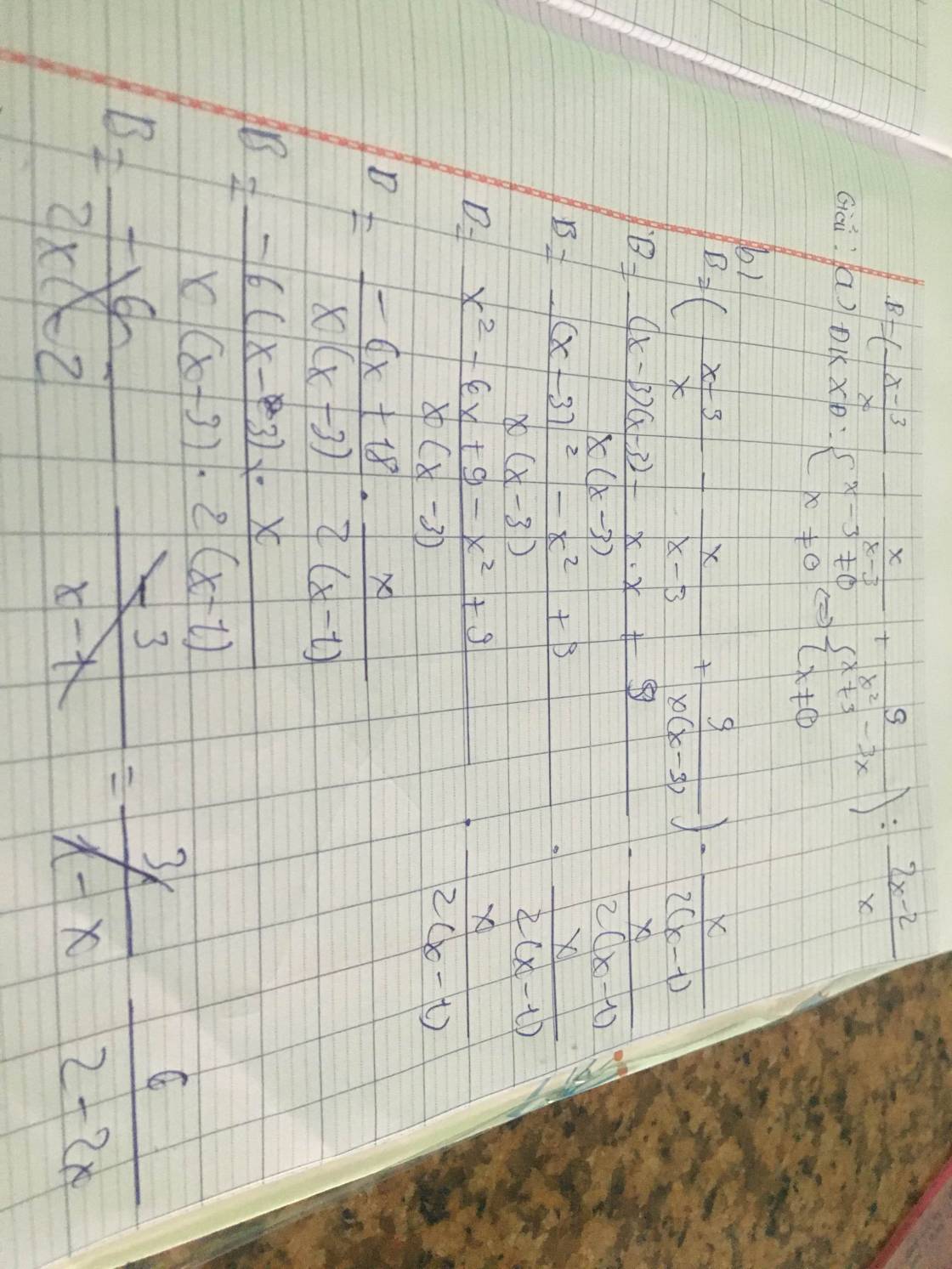Hãy nhập câu hỏi của bạn vào đây, nếu là tài khoản VIP, bạn sẽ được ưu tiên trả lời.

Lời giải:
a.
\(A=\left[\frac{(2+x)^2}{(2-x)(2+x)}+\frac{4x^2}{(2-x)(2+x)}-\frac{(2-x)^2}{(2-x)(2+x)}\right]:\frac{x(x-3)}{x^2(2-x)}\)
\(=\frac{(2+x)^2+4x^2-(2-x)^2}{(2-x)(2+x)}.\frac{x^2(2-x)}{x(x-3)}=\frac{4x(x+2)}{(2-x)(2+x)}.\frac{x^2(2-x)}{x(x-3)}=\frac{4x^2}{x-3}\)
b.
Khi $x=12$ thì $A=\frac{4.12^2}{12-3}=64$
c.
$A=1\Leftrightarrow \frac{4x^2}{x-3}=1$
$\Leftrightarrow 4x^2=x-3$
$\Leftrightarrow 4x^2-x+3=0$
$\Leftrightarrow (2x-\frac{1}{4})^2=-\frac{47}{16}< 0$ (vô lý)
Vậy không tồn tại $x$
d. Để $A$ nguyên thì $\frac{4x^2}{x-3}$ nguyên
$\Leftrightarrow 4x^2\vdots x-3$
$\Leftrightarrow 4(x^2-9)+36\vdots x-3$
$\Leftrightarrow 36\vdots x-3$
$\Leftrightarrow x-3\in\left\{\pm 1;\pm 2;\pm 3;\pm 4;\pm 9; \pm 12; \pm 36\right\}$
Đến đây bạn có thể tự tìm $x$ được rồi, chú ý ĐKXĐ để loại ra những giá trị không thỏa mãn.
e.
$A>4\Leftrightarrow \frac{4x^2}{x-3}>4$
$\Leftrightarrow \frac{x^2}{x-3}>1$
$\Leftrightarrow \frac{x^2-x+3}{x-3}>0$
$\Leftrightarrow x-3>0$ (do $x^2-x+3>0$ với mọi $x$ thuộc ĐKXĐ)
$\Leftrightarrow x>3$. Kết hợp với đkxđ suy ra $x>3$

Bài này đã có tại đây:
Cho biểu thức: \(A=\left(\dfrac{2+x}{2-x}-\dfrac{4x^2}{x^2-4}-\dfrac{2-x}{2+x}\right):\dfrac{x^2-3x}{2x^2-x^3}\)Với ... - Hoc24

 c/
c/
Ta có : B=2=>6/2-2x
<=>6=4-4x
<=>6-4=-4x
<=>-4x=2
<=>x=2/-4=-1/2
d/ĐKXĐ:2-2x≠0
<=>2(1-x)≠0<=>-2(x-1)≠0
<=>x≠1
Để giá trị của biểu thức B nguyên thì 2-2x là Ư(6)
=>2-2x ∈ Ư(6)={±1;±2;±3;±6) Nếu 2-2x=1=> -2x=-1=>x=1/2( thoả mãng)
Rồi còn nhiêu bạn tự xét trường hợp y trang cách làm ở trênn nnhan :;)).À sẽ có mấy cái trường hợp nó giống ĐKXĐ thì bạn ghi trong ngoặc ko thoã mãn nhan.

a, ĐKXĐ: x3+8≠0 ⇔ x≠-2
b, \(\dfrac{2x^2-4x+8}{x^3+8}\)=\(\dfrac{2\left(x^2-2x+4\right)}{\left(x+2\right)\left(x^2-2x+4\right)}\)=\(\dfrac{2}{x+2}\)
c, vì x=2 thỏa mãn đkxđ nên khi thay vào biểu thức ta có:
\(\dfrac{2}{2+2}\)=\(\dfrac{1}{2}\)
d, \(\dfrac{2}{x+2}\)=2 ⇔ 2x+4=2 ⇔ 2x=-2 ⇔ x=-1 (TMĐKXĐ)
Nên khi phân thức bằng 2 thì x=-1

a, ĐKXĐ: x≠±2
A=\(\left(\dfrac{x}{x^2-4}+\dfrac{2}{2-x}+\dfrac{1}{x+2}\right)\left(x-2+\dfrac{10-x^2}{x+2}\right)\)
A=\(\left(\dfrac{x}{x^2-4}-\dfrac{2x+4}{x^2-4}+\dfrac{x-2}{x^2-4}\right)\left(\dfrac{x^2+2x}{x+2}-\dfrac{2x+4}{x+2}+\dfrac{10-x^2}{x+2}\right)\)
A=\(\left(\dfrac{-6}{x^2-4}\right)\left(\dfrac{6}{x+2}\right)\)
A=\(\dfrac{-36}{\left(x-2\right)\left(x+2\right)^2}\)
b, |x|=\(\dfrac{1}{2}\)
TH1z: x≥0 ⇔ x=\(\dfrac{1}{2}\) (TMĐKXĐ)
TH2: x<0 ⇔ x=\(\dfrac{-1}{2}\) (TMĐXĐ)
Thay \(\dfrac{1}{2}\), \(\dfrac{-1}{2}\) vào A ta có:
\(\dfrac{-36}{\left(\dfrac{1}{2}-2\right)\left(\dfrac{1}{2}+2\right)^2}\)=\(\dfrac{96}{25}\)
\(\dfrac{-36}{\left(\dfrac{-1}{2}-2\right)\left(\dfrac{-1}{2}+2\right)^2}\)=\(\dfrac{32}{5}\)
c, A<0 ⇔ \(\dfrac{-36}{\left(x-2\right)\left(x+2\right)^2}\) ⇔ (x-2)(x+2)2 < 0
⇔ {x-2>0 ⇔ {x>2
[ [
{x+2<0 {x<2
⇔ {x-2<0 ⇔ {x<2
[ [
{x+2>0 {x>2
⇔ x<2
Vậy x<2 (trừ -2)

a, ĐKXĐ: x2-4≠0 ⇔ x≠±2
b, \(\dfrac{x^2-4x+4}{x^2-4}\)=\(\dfrac{\left(x-2\right)^2}{\left(x-2\right)\left(x+2\right)}\)=\(\dfrac{x-2}{x+2}\)
c, |x|=3
TH1: x≥0 thì x=3 (TMĐK)
TH1: x<0 thì x=-3 (TMĐK)
Thay x=3 và biểu thức ta có:
\(\dfrac{3-2}{3+2}\)=\(\dfrac{1}{5}\)
Thay x=-3 và biểu thức ta có:
\(\dfrac{-3-2}{-3+2}\)=5

`a)ĐK:x^2-4 ne 0<=>x^2 ne 4`
`<=>x ne 2,x ne -2`
`b)A=(x^2-4x+4)/(x^2-4)`
`=(x-2)^2/((x-2)(x+2))`
`=(x-2)/(x+2)`
`c)|x|=3`
`<=>` \(\left[ \begin{array}{l}x=3\\x=-3\end{array} \right.\)
`<=>` \(\left[ \begin{array}{l}A=\dfrac{3-2}{3+2}=\dfrac15\\x=\dfrac{-3-2}{-3+2}=5\end{array} \right.\)
`d)A=2`
`=>x-2=2(x+2)`
`<=>x-2=2x+4`
`<=>x=-6`
a, ĐKXĐ: \(x^2-4\ne0\Leftrightarrow x\ne\pm2\)
b, Ta có: \(\dfrac{x^2-4x+4}{x^2-4}=\dfrac{\left(x-2\right)^2}{\left(x-2\right)\left(x+2\right)}=\dfrac{x-2}{x+2}\) (*)
c, \(\left|x\right|=3\Rightarrow x=\pm3\)
_ Thay x = 3 vào (*), ta được: \(\dfrac{3-2}{3+2}=\dfrac{1}{5}\)
_ Thay x = -3 vào (*), ta được: \(\dfrac{-3-2}{-3+2}=5\)
d, Có: \(\dfrac{x-2}{x+2}=2\)
\(\Leftrightarrow x-2=2\left(x+2\right)\)
\(\Leftrightarrow x-2=2x+4\)
\(\Leftrightarrow x=-6\left(tm\right)\)
Vậy...
a,\(A=\dfrac{x+4}{x^2-2x}+\dfrac{2}{x}\)
\(=\dfrac{x+4}{x\left(x-2\right)}+\dfrac{2}{x}\)
\(=\dfrac{x+4}{x\left(x-2\right)}+\dfrac{2\left(x-2\right)}{x\left(x-2\right)}\)
\(=\dfrac{x+4+2x-4}{x\left(x-2\right)}\)
\(=\dfrac{3x}{x\left(x-2\right)}=\dfrac{3}{x-2}\)
b, Để A có giá trị bằng - 3
\(\Leftrightarrow\dfrac{3}{x-2}=-3\)
\(\Leftrightarrow x-2=-1\)
\(\Leftrightarrow x=1\) ( t/m )
Vậy x = 1 thì A có giá trị bằng -3